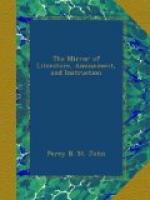The Rev. Mr. Gilpin, in his charming little volume on Picturesque Beauty,[2] has a few appropriate observations: after passing Wilton—
[2] Observations on the River
Wye, &c. By William Gilpin,
M.A.—Fifth Edition.
“We met with nothing for some time during our voyage but grand, woody banks, one rising behind another; appearing and vanishing by turns, as we doubled the several capes. But though no particular objects characterized these different scenes, yet they afforded great variety of pleasing views, both as we wound round the several promontories, which discovered new beauties as each scene opened, and when we kept the same scene a longer time in view, stretching along some lengthened reach, where the river is formed into an irregular vista by hills shooting out beyond each other and going off in perspective.”
We ought not to forget to mention Ross, and its association with one of the noblest works of god—honest John Kyrle, celebrated as the Man of Ross. Pope, during his visits at Holm-Lacey, in the vicinity, obtained sufficient knowledge of his beneficence, to render due homage to his worth in one of the brightest pages of the records of human character.
* * * * *
“Mother Carey’s chickens”—Eggs.
(For the Mirror.)
In a paper on the Superstitions of the Sea, a few years ago,[3] I slightly alluded to the nautical belief that the appearance of the Stormy Petrel, and other marine birds at sea, was often considered to be the forerunner of peril and disaster; and as your excellent correspondent, M.L.B., in a recent number, expresses a wish to know the origin of the soubriquet of Mother Carey’s Chickens, which the former birds have obtained, I now give it with all the brevity which is consistent with so important a narration. It appears that a certain outward-bound Indiaman, called the Tiger, (but in what year I am unable to state,) had encountered one continued series of storms, during her whole passage; till on nearing the Cape of Good Hope, she was almost reduced to a wreck. Here, however, the winds and waves seemed bent on her destruction; in the midst of the storm, flocks of strange looking birds were seen hovering and wheeling in the air around the devoted ship, and one of the passengers, a woman called “Mother Carey,” was observed by the glare of the lightning to laugh and smile when she looked at these foul-weather visitants; on which she was not only set down as a witch, but it was also thought that they were her familiars, whom she had invoked from the Red Sea; and “all hands” were seriously considering on the propriety of getting rid of the old beldam, (as is usual in such cases,) by setting her afloat, when she saved them the trouble, and at that moment jumped overboard, surrounded by flames; on which the birds vanished, the storm cleared away, and the tempest-tossed Tiger went peacefully on her course! Ever since the occurrence of this “astounding yarn,” the birds have been called “Mother Carey’s Chickens,” and are considered by our sailors to be the most unlucky of all the feathered visitants at sea.




